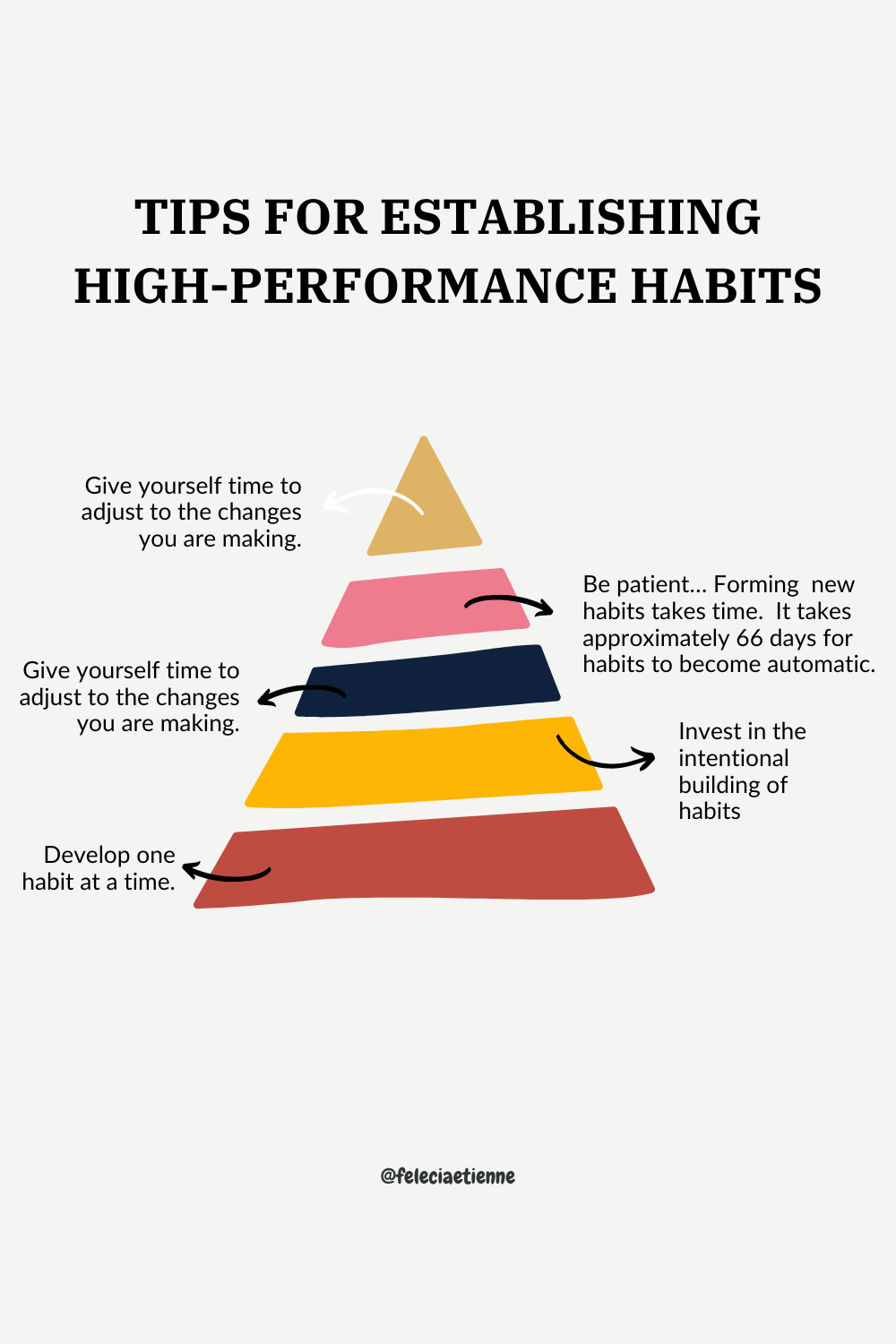The productivity lies: Debunking the 5 most popular productivity myths
The productivity lies: Debunking the 5 most popular productivity myths
Do you ever feel like productivity is a myth, like no matter how hard you try and what techniques you use, you can never seem to get anything done? It's okay; we've all been there. But why does this keep happening? Could it be that we’re stuck in the same loop of ineffective habits and beliefs about productivity that just don’t work?
If we haven't met, hi, my name is Felecia! I'm a Certified High-Performance Success Coach and Business & Life Strategist! I love to help overwhelmed, stressed-out ambitious, high-achieving women maximize their time, energy, productivity, and influence so they can be present and intentional with the vital aspects of their life.
I do this through proven science-backed and outcome-based high-performance strategies, routines, habits, and mindset shifts that are simple, sustainable, and fun.
Let's explore the five most popular myths about productivity and uncover the truth behind them once and for all. Join me on a journey as we dispel common misconceptions, provide evidence-based advice to hone your focus, create more efficient processes, and ultimately achieve long-term success faster than ever before!
Make it stand out
Whatever it is, the way you tell your story online can make all the difference.
1. Relentless discipline is the key to growing and achieving success.
“Success is not final; failure is not fatal: It is the courage to continue that counts.” Winston Churchill
Too often, success is wrongly attributed to having relentless discipline. We all have a built-in amount of discipline, but the truth is that no more is needed than we already possess. To be successful, it is not necessary to become a person where every action must be trained, and control has become the answer to everything. Rather, success requires only enough discipline to develop habits so that success becomes automatic and effortless. Less effort can lead to greater success if you are doing the right things instead of trying to do everything perfectly. A sprint of disciplined effort can get you far in life, and there’s no need for an unrelenting marathon - something much easier said than done!
That's where High-Performance Habits come in:
Focusing on the right things at the right time rather than spending all your energy trying to become ultra-disciplined. You can achieve more with less effort by learning how to develop and maintain high-performance habits. Too many people assume that taking on significant new habits requires unending discipline and willpower, but this isn't true.
Super-successful individuals don't have an innate superpower; they just put in the hard work to make sure that a few essential behaviors become part of their daily lives. The process isn't easy or quick: research shows that a habit takes around 66 days to form completely.
Taking this into account, aim to develop one habit at a time and give yourself time to adjust to the changes you are making. After mastering one habit, then you can consider adding another if appropriate - small successes add up over time! Don't be overcome by the narrative of relentless self-discipline, but invest in the intentional building of habits.
Related Article: 11 c’s of High-Performance Living: How to Unlock Your Full Potential
2. Time management is essential to becoming more productive and successful.
“You have a brain and mind of your own. Use it, and reach your own decisions.”Napoleon Hill
Time management is not the sole factor of success; it is simply the tool. Good decision-making, however, is what will truly set you apart and make you successful. Without good decisions and a plan to execute them, no amount of time management will take you anywhere meaningful. You have to be able to think critically and make wise choices in order to get where you want to go. When you combine powerful decision-making with effective time management, anything is possible. With this combination, you can unlock unlimited potential and create the life of your dreams! Take control now - don't let time be wasted without purpose. Make every second count!
We’re often made to believe that managing our time is a matter of relentless discipline and that our productivity will suffer if we don’t have it. While discipline can help us stay on top of things, there are many other effective strategies for managing our time better. These include setting clear goals and expectations; creating routines and schedules; delegating tasks whenever possible; using technology to help automate tasks; and taking regular breaks for rest and reflection.
Related Article: Top 10 Reasons Why Most People FAIL at Time Management
2 habits that will make you a better decision-maker
Are you looking for ways to make smart decisions and become a better decision-maker? Here are three habits that will help you do just that.
1. Spend time reflecting on the lessons you’ve learned from your successes and failures.
It's essential to devote regular time to reflect on our mistakes and successes in order to gain valuable insights into our decision-making ability. This helps us identify any wrong assumptions we may have made in the past, as well as recognize any positive strategies which have been successful.
Plus, it can also be a great way to boost our mental fitness. Rather than dwelling on our mistakes, we should use this time to honestly evaluate our decisions from the day and consider why some proved more successful than others. What caused us to make these mistakes? Perhaps an assumption was way off base, or other input wasn’t sought. Maybe we didn’t give ourselves enough time to think, or we made a knee-jerk decision out of fear.
By taking the time to reflect, we can analyze the situation and look at alternative choices that may have been available. Using this knowledge, we can gain an understanding of what needs to be done differently going forward. Ultimately, although our mistakes cannot be taken back, they can be used as a way to learn and grow, improving our decision-making skills in the process.
Follow these steps to make powerful, persuasive decisions with the acronym D.E.S.I.G.N:
D - Define the problem and the desired outcome, then explore all the possible solutions before making any decisions or taking any action.
E - Evaluate each solution for its pros and cons, as well as its implications on the overall goal you have in mind, including how it will affect your reputation or relationships with others involved in the decision-making process.
S - Strategize a plan of action to ensure success by delegating tasks, creating deadlines, brainstorming ways to mitigate risks, and anticipating potential obstacles that may come up along the way.
I - Implement the plan of action promptly after deciding which option is best suited for your goals while keeping an open mind and remaining flexible should something unexpected arise during implementation.
G - Gather data throughout this entire process in order to monitor progress and track results so that you can adjust accordingly over time if needed.
N - Negotiate a resolution should any issues arise that could lead to failure or unfinished tasks, then evaluate results once again before making any final decisions or taking further action if necessary.
Related Article: How To Make a Big, Terrifying Decision as a female entrepreneur and leader
3. With a strong sense of determination, willpower is always accessible
“When people have a willpower failure, it's because they haven't anticipated a situation that's going to come along.” Charles Duhigg
We've all heard the saying, "where there's a will, there's a way," but this is only partially true when it comes to willpower. Yes, you can accomplish anything with determination - but understanding how to build and use your willpower effectively is key to success.
This concept was explored in the famous Marshmallow Test from Stanford University.
Researchers offered 500 toddlers the choice between one of three treats, with the promise that if they waited fifteen minutes, they'd get a second treat. Only three in ten succeeded in waiting.
Decades later, researchers found that those who were able to withhold from eating the treat had more successful lives - higher test scores and academic achievements, better stress management, and a greater sense of self-worth.
Willpower is like your phone's battery - the more you use it, the more it wanes until it’s gone. That's why it feels almost impossible to resist unhealthy snacks when you come home after a long day. To prevent this, be aware of activities that suck away your willpower - such as establishing new habits, fighting distractions, resisting temptation, and so on.
If you want to make the most of your day, focus on your 'Needle Movers' early in the day before your willpower is drained. Build activities around it, so you can count on it when you need it most! With this approach, you can be certain that your willpower will not fail you when it matters most.
4. All things are of equal importance
“Clarity is the counterbalance of profound thoughts.” Luc de Clapiers
We can have whatever we wish for, yet not everything imaginable. Allocating our time to one thing implies that we cannot spend it on something else — regardless of whether it is intentional. This commonly brings up the toughest challenge when it comes to productivity.
For so long, we've heard that you can have it all and accomplish it. People believe that you can have a fulfilling career while also having a loving and supportive marriage, raising well-adjusted children, keeping a great body and good health, traveling regularly, maintaining close and interesting relationships with friends — the list goes on.
In reality, though, most of us are able to juggle three or four of these priorities at a time.
Psychological research has proven that we tend to remember the information we've heard often and early on, thus giving it an inflated importance in our minds. That is why work-life balance remains so widely talked about.
Rather than aiming for balance, strive for counterbalance — switch between your priorities according to the situation. For instance, if you're working long hours on a project, make sure to pencil in plenty of time to reconnect with your family afterward.
This shift is key to success. Once we have clarity on what truly matters, we can concentrate our energy and attention on the most important task at hand — this is when great things happen!
5. Multitasking gives you an edge
“You can do two things at once, but you can’t focus effectively on two things at once.” Gary Keller
Do you constantly feel like you're juggling multiple tasks? That's because you are - and it's taking a toll. Contrary to what some may believe, multitasking just doesn't work. It may seem as if we're accomplishing more, but in reality, our brains can focus on one task at a time. This means that switching back and forth between tasks comes with a lower level of efficiency than if we would just focus on each task individually.
Take a look around you - do you have multiple browser windows open, your inbox steadily filling up in the background, messages popping up from different teammates, and your phone ringing? It's time to put our multitasking habits to an end and focus on one task at a time. Doing so will help increase our productivity, reduce stress levels, and improve our performance. Let's break the multitasking cycle now!
Multitasking has been shown to cause disastrous consequences on our mental and physical health. Numerous studies have revealed that multitasking negatively impacts our working memory, leading to increased anxiety, inhibited creative thinking, and the inability to reach a state of flow - an incredibly productive mindset where we become 500% more effective.
Furthermore, multitasking can reduce IQ by an average of 10 points, lengthen task completion times, and have the same detrimental effect as losing a night's sleep. In short - multitasking is not worth it. So next time you're tempted to do several things at once, remember the serious repercussions!
To perform optimally, you need to be aware of the three distinct forms of multitasking:
1. Serial Multitasking:
This involves doing one task after another in a linear fashion. You can think of this as switching back and forth between tasks. For example, if you’re writing an essay and need to occasionally check your phone for emails or messages, that’s serial multitasking.
2. Simultaneous Multitasking:
This involves doing two or more tasks at the same time. For instance, talking on the phone while checking emails is an example of simultaneous multitasking.
3. Hybrid Multitasking:
This is a combination of serial and simultaneous multitasking. You can think of hybrid multitasking as taking advantage of pauses in one task to start or finish another. For example, if you’re on a conference call and need to respond to emails, you can use the pauses in the conversation to quickly answer any emails that have come in.
Each has grave effects on our ability to do Outstanding work!
The key is to start by paying attention to how you manage your tasks each day. Identify which activities require more of your attention and prioritize those. Set aside specific blocks of time for particular tasks and focus on just that task during that window. You'll be surprised at how much more you can get done when you're focused on just one thing! So take the first step - stop multitasking today and start taking back control of your attention, focus, and time!
Bottom-line:
Despite the prevalence of these myths, it’s clear that hard-hitting discipline and time management are not the only markers of success. Looking beyond these traditional messages, being mindful of balancing the importance of tasks, embracing moments for rest, and finding creative solutions can serve to accomplish goals. Determination, willpower, self-reliance, and focusing on one task at a time are essential for productivity. Book your complimentary high-performance strategy session now to discover more tips to accelerate your personal growth journey. You owe it to yourself to live your life to the fullest potential. It all starts with creating smarter habits within our daily routines-- so why wait? Start creating change today and see what opportunities may truly present themselves.
P.S. Need additional support in living a high-performance life. Grab my Level Up and Thrive EASY Checklist.











